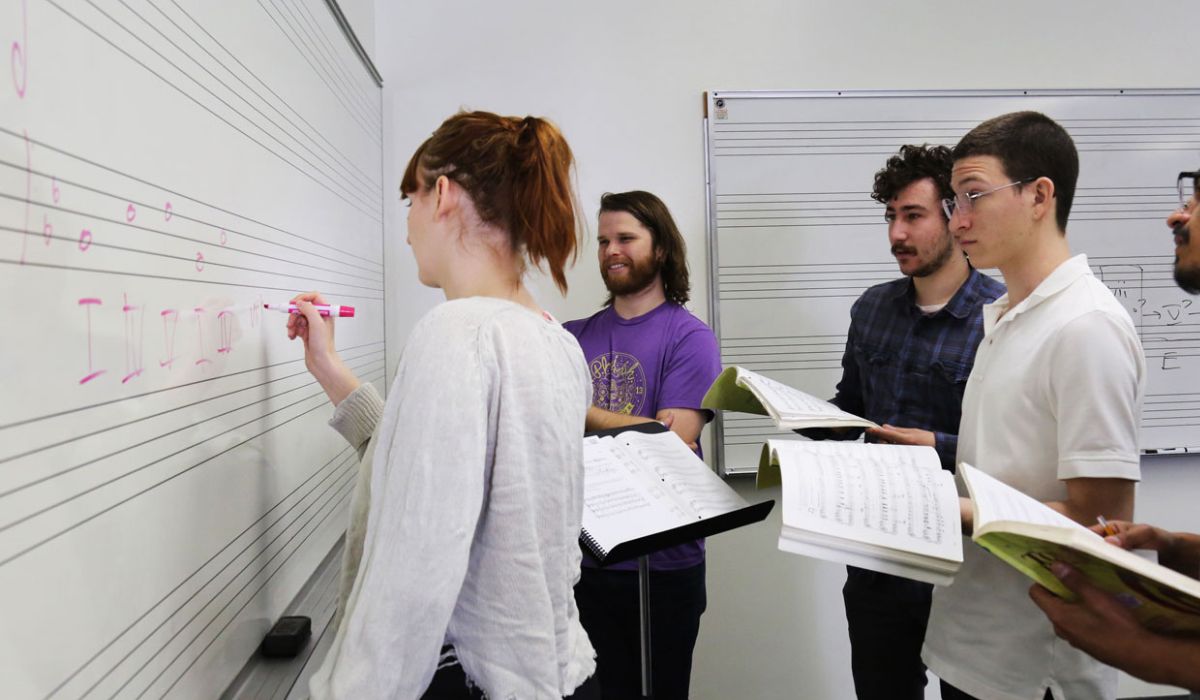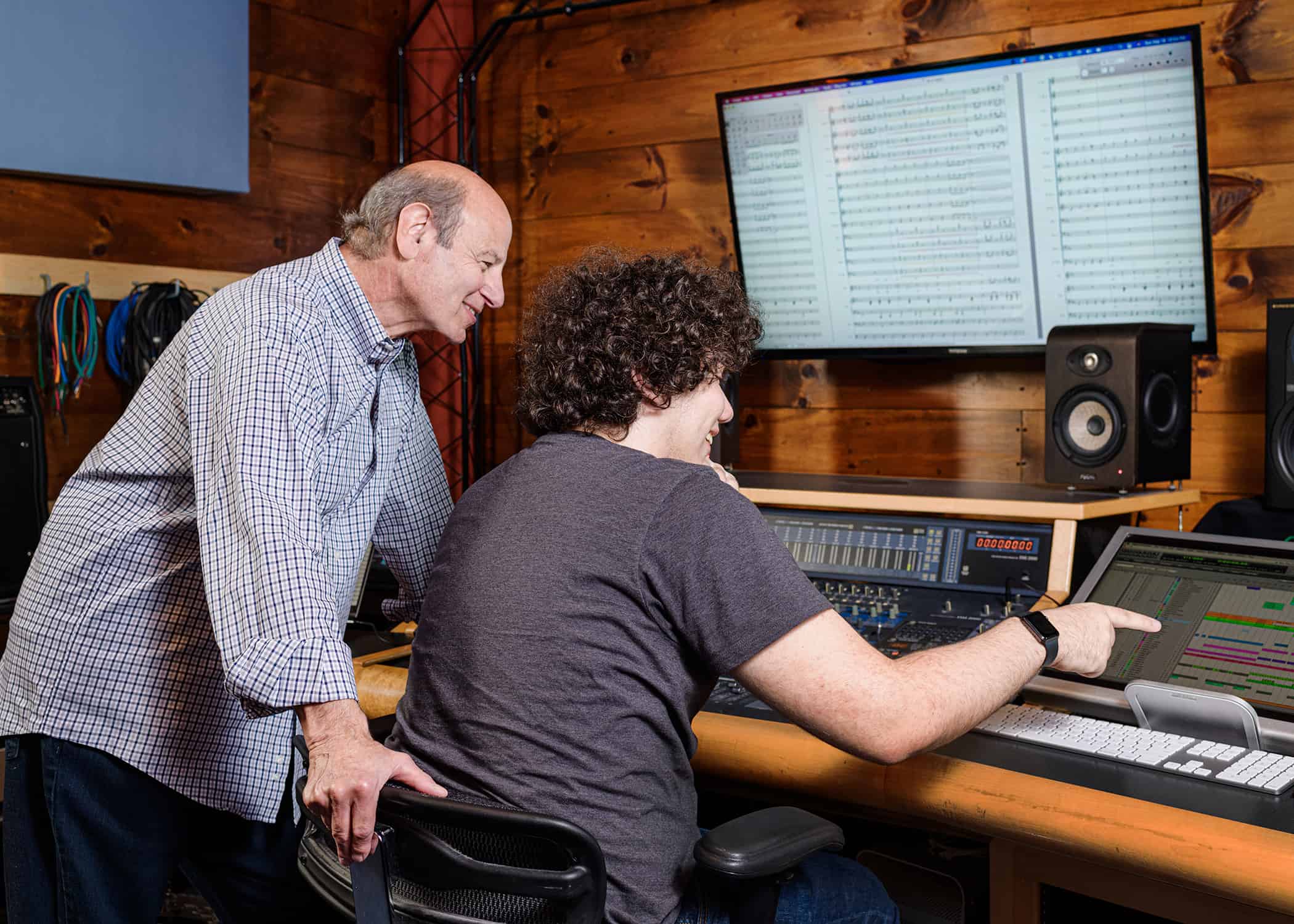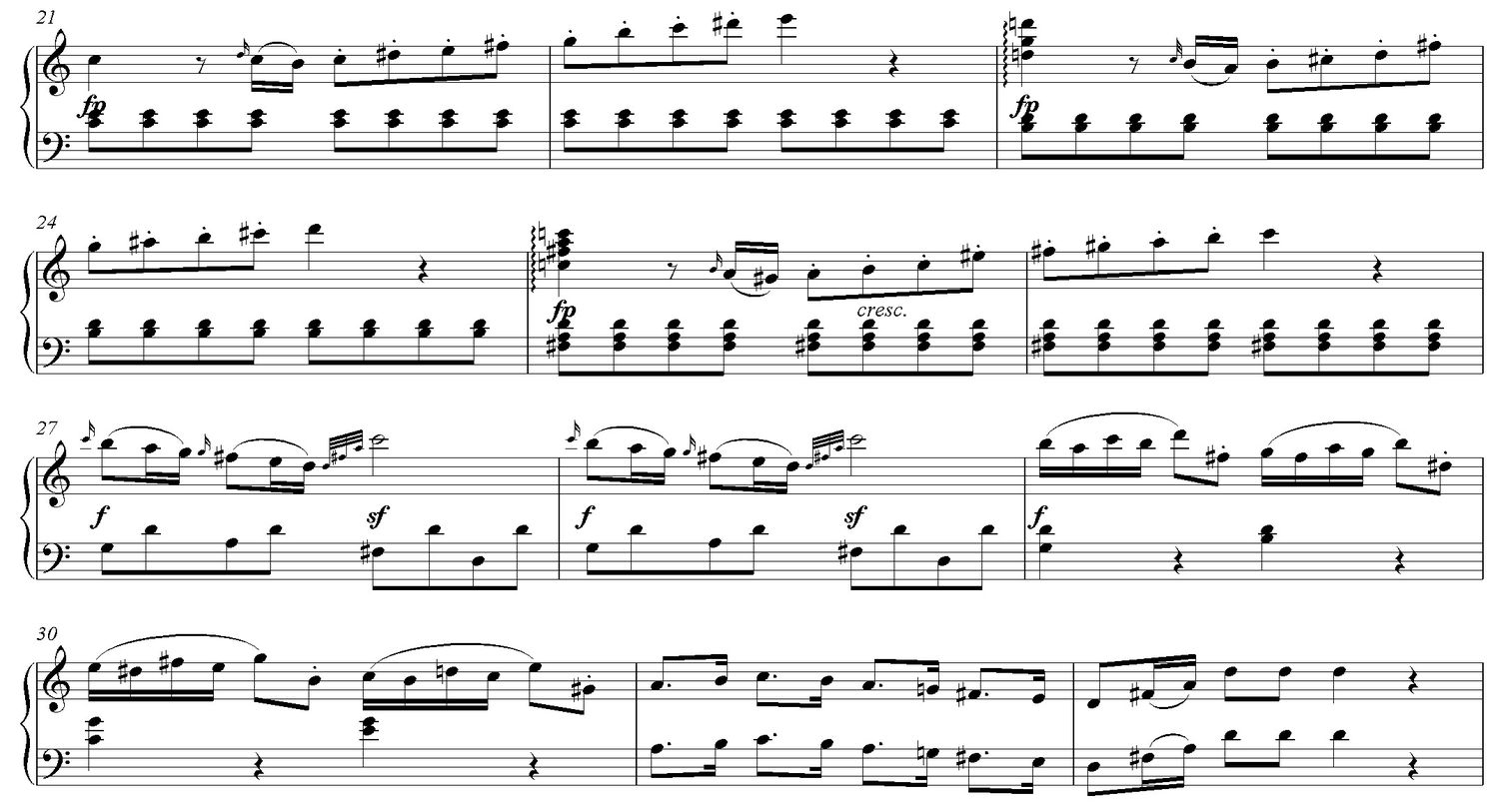Home>Production & Technology>Music Theory>How To Study For The AP Music Theory


Music Theory
How To Study For The AP Music Theory
Published: January 31, 2024
Learn effective study strategies and tips for mastering Music Theory in preparation for your AP exam. Discover resources, practice techniques, and expert advice to excel in Music Theory.
(Many of the links in this article redirect to a specific reviewed product. Your purchase of these products through affiliate links helps to generate commission for AudioLover.com, at no extra cost. Learn more)
Table of Contents
- Introduction
- Understanding the AP Music Theory Exam
- Developing a Study Plan
- Reviewing Music Fundamentals
- Practicing Written and Aural Skills
- Analyzing Musical Examples
- Preparing for the Multiple-Choice Section
- Reviewing Free-Response Questions
- Utilizing Study Resources
- Taking Mock Exams
- Last-Minute Exam Tips
- Conclusion
Introduction
Preparing for the AP Music Theory exam can be a daunting task, but with the right approach and study plan, it is possible to score well and showcase your knowledge of music theory. Whether you are a high school student looking to earn college credit or a music enthusiast eager to deepen your understanding of theory, this article will provide you with valuable insights and guidance on how to effectively prepare for the AP Music Theory exam.
The AP Music Theory exam assesses your understanding of key concepts in music theory and your ability to apply them in various musical contexts. It consists of multiple-choice questions, free-response questions, sight-singing, and aural skills tasks. By demonstrating your proficiency in areas such as notation, scales, chords, harmony, ear training, and analysis, you can earn college credit or advanced placement in music theory courses.
To succeed in this exam, it is essential to develop a strategic study plan that covers all aspects of the curriculum. This includes reviewing music fundamentals, practicing written and aural skills, analyzing musical examples, and familiarizing yourself with the exam format. Additionally, utilizing study resources such as textbooks, online courses, and mock exams can greatly enhance your preparation.
In the following sections, we will delve into each aspect of studying for the AP Music Theory exam in more detail. Whether you’re a novice in music theory or an experienced musician, this guide will provide you with the tools and strategies needed to approach the exam with confidence and excel in your musical journey.
Understanding the AP Music Theory Exam
Before diving into your study plan, it is crucial to have a clear understanding of what the AP Music Theory exam entails. This knowledge will help you navigate the exam content and structure more effectively.
The AP Music Theory exam consists of two main sections: multiple-choice and free-response. The multiple-choice section assesses your knowledge of music theory concepts, including notation, scales, chords, rhythm, melody, and more. In this section, you will be presented with a series of questions and asked to choose the correct answer from several options. The free-response section, on the other hand, requires you to demonstrate your musical skills and understanding through written and aural tasks. This includes tasks such as harmonizing a melody, analyzing a musical excerpt, and composing a short piece.
Another important component of the AP Music Theory exam is the sight-singing and aural skills section. In this part, you will be asked to sing a given melody or play it on a keyboard while adhering to specific guidelines. This section evaluates your ability to accurately interpret and perform music by ear, testing skills such as pitch recognition, rhythm, and tonal memory.
It is vital to familiarize yourself with the exam format and scoring guidelines to understand what is expected of you and how your responses will be evaluated. The multiple-choice section is scored based on the number of correct answers, and there is no penalty for incorrect answers. The free-response section is assessed by trained examiners, who evaluate your responses based on the given scoring rubrics. Each section carries a specific weightage in the overall exam score, so it is important to allocate your study time accordingly.
Being aware of the topics covered in the exam is equally important. The AP Music Theory course includes content such as music notation and reading, intervals and scales, chords and harmony, key signatures and tonality, musical analysis, and composition. Understanding these core concepts and practicing them extensively will significantly improve your chances of success on the exam.
By gaining a thorough understanding of the exam structure, scoring guidelines, and content areas, you can approach your study plan with clarity and focus. Let’s now explore how to develop an effective plan to prepare for the AP Music Theory exam.
Developing a Study Plan
Creating a well-structured study plan is essential for effectively preparing for the AP Music Theory exam. By organizing your time and resources, you can maximize your learning and ensure comprehensive coverage of the exam content. Here are some steps to help you develop a successful study plan:
- Assess your current knowledge: Start by evaluating your current level of understanding in various music theory concepts. This self-assessment will help you identify your strengths and weaknesses, enabling you to allocate more time to challenging areas.
- Set specific goals: Determine what you aim to achieve through your study plan, whether it’s earning a specific score, mastering certain topics, or improving your overall musical skills.
- Break down the content: Divide the exam content into manageable sections and create a schedule to cover each topic systematically. This could include dedicating specific days or weeks to different concepts.
- Allocate study time: Determine how much time you can dedicate to studying each day or week. Be realistic and create a schedule that suits your other commitments while allowing for consistent and focused study sessions.
- Use a variety of resources: Gather study materials such as textbooks, online courses, practice exams, and instructional videos to enhance your understanding and reinforce your learning. Variety can help keep your study sessions engaging and prevent monotony.
- Practice regularly: Dedicate time to consistent practice of written and aural skills. This could involve exercises like sight-singing, melodic dictation, harmonic analysis, and composition. Regular practice will reinforce your skills and build confidence in your abilities.
- Review and revise: Regularly review previous topics to reinforce your knowledge and identify any gaps. Make use of flashcards, summary notes, and quizzes to aid in retention and recall.
- Track your progress: Monitor your progress periodically by taking practice exams or quizzes. Evaluate your performance, identify areas that need improvement, and adjust your study plan accordingly.
- Seek help if needed: If you encounter challenging concepts or have difficulty grasping certain topics, don’t hesitate to seek assistance from a teacher, tutor, or online forums. Getting clarification and guidance can greatly enhance your understanding.
Remember, consistency and discipline are key to a successful study plan. By following these steps and staying committed to regular and focused study, you’ll be well-prepared to tackle the AP Music Theory exam with confidence. In the next sections, we’ll explore specific areas to focus on during your preparation.
Reviewing Music Fundamentals
Before delving into more advanced music theory concepts, it is important to have a solid foundation in music fundamentals. Reviewing these basics will not only refresh your understanding but also ensure a strong framework for further learning. Here are some key areas to focus on when reviewing music fundamentals:
- Music notation: Familiarize yourself with standard music notation symbols, including note values, rests, time signatures, key signatures, and dynamics. Practice reading and writing musical notation to improve your fluency.
- Intervals: Understand the concept of intervals, both melodic intervals (the space between two pitches) and harmonic intervals (the combination of two pitches). Learn to identify and name intervals by sight and sound.
- Scales and modes: Study different scales and modes, including major and minor scales, the modes of the major scale (such as Dorian and Mixolydian), and the pentatonic and blues scales. Practice playing these scales on your instrument or voice.
- Chords and harmony: Review common chord types, such as triads (major, minor, augmented, diminished) and seventh chords. Understand chord progressions, including functional harmony and common chord patterns.
- Rhythm and meter: Refresh your understanding of rhythmic notation, including note durations, rests, and time signatures. Practice reading and clapping rhythms to improve your rhythmic accuracy and internalization.
Additionally, take the time to familiarize yourself with musical terms and symbols widely used in music notation. This includes dynamics markings (such as forte and piano), articulations (staccato, legato), and other expressive markings (crescendo, decrescendo).
While reviewing music fundamentals, it’s beneficial to engage in active learning techniques. This could involve hands-on activities such as playing your instrument or singing, analyzing musical scores, and composing short musical examples. Interactive exercises and quizzes can also aid in reinforcing your understanding of these foundational concepts.
Remember that building a solid foundation in music fundamentals is crucial for your success in more complex music theory concepts. Take the time to review and practice these fundamentals until you feel confident in your knowledge and application. In the next sections, we’ll explore additional areas to focus on when preparing for the AP Music Theory exam.
Practicing Written and Aural Skills
Developing strong written and aural skills is essential for success on the AP Music Theory exam. These skills require practice and refinement, as they are tested in both the free-response and sight-singing/aural skills sections of the exam. Here are some strategies to help you effectively practice these skills:
Written Skills:
- Music dictation: Practice transcribing melodies, rhythms, and chords by ear. Start with simple examples and gradually increase the complexity. Focus on accurate rhythmic notation, pitch recognition, and writing correct chord symbols or functional harmony analysis.
- Harmonic analysis: Analyze musical excerpts by identifying chords, their inversions, and their harmonic functions. Practice recognizing harmonic progressions and understanding how chords relate to the overall tonal structure.
- Part writing: Practice part writing exercises by harmonizing given melodies using appropriate voice leading principles. Pay attention to proper voice leading, chord spacing, and understanding the rules of good part writing.
- Composition exercises: Engage in composing short musical pieces within specific guidelines. Experiment with different musical ideas, chord progressions, and melodic structures. Focus on applying the principles of music theory you have learned.
Aural Skills:
- Sight-singing: Practice sight-singing exercises by singing melodic examples with accurate pitch and rhythm. Use solfege, such as movable do or scale degrees, to aid in pitch recognition. Gradually work on more complex melodies and incorporate additional elements, such as dynamics and articulations.
- Melodic and harmonic dictation: Improve your ability to hear and notate melodies and harmonic progressions. Practice identifying and notating melodies, chord qualities, and progressions by ear. Focus on rhythmic accuracy and pitch recognition.
- Rhythm recognition: Develop your rhythmic accuracy by clapping or tapping rhythmic patterns and sight-reading rhythms. Practice different subdivisions, complex rhythms, and syncopated patterns.
- Interval identification: Train your ear to recognize different intervals by listening to examples and practicing interval recognition exercises. Focus on both ascending and descending intervals and be able to identify intervals in various musical contexts.
Consistent and regular practice is key to improving your written and aural skills. Set aside dedicated practice time for these areas, and gradually increase the difficulty level as you progress. Utilize resources such as online ear training programs, practice books, and mobile apps to supplement your practice sessions.
Remember to actively listen to music regularly, both within the context of your study and in your daily life. Analyze different musical styles and genres, paying attention to the use of harmony, rhythm, melody, and texture. Develop your musical ear by engaging with a wide range of musical examples.
By honing your written and aural skills, you’ll be well-prepared to tackle the corresponding sections of the AP Music Theory exam. In the next section, we’ll explore the importance of analyzing musical examples in your preparation.
Analyzing Musical Examples
Analyzing musical examples is a crucial aspect of studying for the AP Music Theory exam. By honing your analytical skills, you’ll develop a deeper understanding of how music works and be better prepared to apply analytical techniques on the exam. Here are some key strategies for effectively analyzing musical examples:
Score Study:
Begin by examining the musical score. Look for patterns, key signatures, time signatures, and any recurring motifs or themes. Identify the form of the composition, whether it’s a sonata, fugue, or other structure. Take note of any key changes, modulations, and pivot chords that may occur throughout the piece.
Harmonic Analysis:
Analyze the harmonic progression of the piece. Identify the chords or harmonic sequences used and their functional relationships within the key. Note any interesting or unusual chord progressions. Pay attention to the use of common harmonic techniques such as circle of fifths progressions or secondary dominants.
Melodic Analysis:
Study the melodic elements within the musical example. Identify the main theme or melodic line and observe any variations or developments. Analyze the use of motives, sequences, and melodic contours. Pay attention to how the melody interacts with the underlying harmony.
Rhythmic and Textural Analysis:
Examine the rhythmic patterns and textures present in the piece. Identify any rhythmic devices such as syncopation, polyrhythms, or irregular time signatures. Analyze the use of texture, whether it’s homophonic, polyphonic, or contrapuntal. Observe how the rhythmic and textural elements contribute to the overall musical expression.
Expressive Elements:
Analyze the expressive elements of the musical example. Pay attention to dynamics, articulations, and phrasing markings. Observe how these elements shape the interpretation and convey the composer’s intentions. Note any changes in dynamics or tempo throughout the piece and how they affect the overall musical narrative.
Contextual Analysis:
Consider the historical and cultural context of the musical example. Familiarize yourself with the composer’s style, musical period, and influences. Understand how the piece fits within the broader context of music history. This broader understanding can provide valuable insights into the composer’s intentions and the significance of the composition.
Throughout your analysis, practice verbalizing your observations and findings. This will help you articulate your thoughts clearly in written and oral responses on the AP Music Theory exam. Additionally, incorporate listening to recordings of the musical examples to deepen your understanding of their interpretation and performance.
By actively analyzing musical examples, you’ll develop a keen ear for musical nuances, enhance your understanding of musical structure, and be well-prepared to tackle analytical questions on the AP Music Theory exam. In the next section, we’ll explore strategies for preparing for the multiple-choice section of the exam.
Preparing for the Multiple-Choice Section
The multiple-choice section of the AP Music Theory exam tests your knowledge and understanding of music theory concepts through a series of questions. To excel in this section, it is crucial to have a solid understanding of the underlying theory and develop effective test-taking strategies. Here are some tips to help you prepare for the multiple-choice section:
- Master the content: Review all the key concepts covered in the AP Music Theory curriculum. Familiarize yourself with topics such as notation, intervals, scales, chords, harmony, rhythm, melody, and form. Ensure that you have a comprehensive understanding of these concepts before moving on to more complex topics.
- Practice interpreting musical notation: The multiple-choice questions often include excerpts of musical scores. Practice reading and analyzing musical notation quickly and accurately. Pay attention to key signatures, time signatures, dynamics, articulations, and other markings.
- Develop your listening skills: The multiple-choice questions may include audio clips that require you to identify intervals, chords, cadences, and other musical elements by ear. Practice active listening by engaging with a variety of musical examples and familiarize yourself with the sound of different intervals, chord qualities, and progressions.
- Review answer choices strategically: When answering multiple-choice questions, read all the answer choices before making a selection. Eliminate options that are clearly incorrect, and then carefully consider the remaining choices. Pay attention to any clues or patterns in the question that may guide you towards the correct answer.
- Manage your time: The multiple-choice section has a time limit, so it is crucial to manage your time effectively. Start with the questions that you find easier or are more confident about. Leave more challenging questions for later, and make sure to allocate enough time to go back and review your answers if time permits.
- Eliminate incorrect answers: If you are unsure about a question, try to eliminate obviously incorrect answer choices. This will increase your chances of selecting the correct answer even if you are not entirely certain.
- Practice with sample exams: Take advantage of practice exams and sample questions available in AP Music Theory review books or online resources. Familiarize yourself with the format, style, and difficulty level of the questions. This will help you become more comfortable with the exam structure and improve your time management skills.
- Seek clarification: If you come across unfamiliar or confusing concepts while practicing, don’t hesitate to seek clarification from your teacher, tutor, or online forums. It’s important to have a clear understanding of any nuances or exceptions to the rules.
Consistent practice and review of music theory concepts, along with specific strategies for tackling multiple-choice questions, will help you perform well in this section of the AP Music Theory exam. In the next section, we’ll discuss the importance of reviewing and preparing for the free-response questions.
Reviewing Free-Response Questions
The free-response section of the AP Music Theory exam is an opportunity for you to demonstrate your skills in musical analysis, composition, and aural tasks. This section allows you to showcase your understanding of music theory concepts in a more creative and expressive manner. To effectively review and prepare for the free-response questions, consider the following:
- Understand the question types: Familiarize yourself with the different types of free-response questions that may appear on the exam. These could include melodic dictation, harmonic analysis, composition, figured bass realization, sight-singing, and other related tasks. Understand the specific requirements and scoring rubrics for each question type.
- Practice each question type: Dedicate specific study time to practice each type of free-response question. This will help you become familiar with the format, develop your skills in each area, and identify areas that require further improvement.
- Compose and analyze musical examples: Practice composing short musical examples within specific guidelines. This could include harmonizing a given melody, creating a chord progression, or writing a short composition. Additionally, analyze musical excerpts by identifying chords, analyzing harmonic progressions, and discussing the formal structure.
- Develop your aural skills: Improve your aural skills by practicing melodic and harmonic dictation, sight-singing, and rhythmic exercises. This will enhance your ability to accurately transcribe and interpret music by ear, which is essential for successful completion of free-response tasks.
- Review scoring guidelines: Become familiar with the scoring guidelines for the free-response questions. Understand the criteria used by examiners to evaluate your responses, and incorporate these factors in your practice. This will help you structure and present your answers in a way that maximizes your potential for scoring well.
- Time management: Consider how much time you will allocate for each free-response question during the actual exam. Practice allocating your time accordingly during practice sessions to ensure you have enough time to complete each task and review your answers.
- Soliciting feedback: Seek feedback from your teacher or tutor on your practice responses. Their input and guidance will help you identify areas for improvement and refine your approach to free-response questions.
- Practice under exam conditions: As you get closer to the exam day, simulate the actual testing environment as much as possible during your practice sessions. This will help familiarize yourself with the time constraints and pressure of the exam and ensure that you can perform at your best.
Consistent practice and review of free-response questions, focusing on specific question types and incorporating feedback, will help you develop confidence and proficiency in these tasks. By mastering the free-response section, you will be well-prepared to showcase your musical knowledge and skills on the AP Music Theory exam. In the next section, we’ll explore different study resources that can further enhance your preparation.
Utilizing Study Resources
When preparing for the AP Music Theory exam, utilizing study resources can greatly enhance your understanding and mastery of the material. Here are some valuable study resources to consider:
- Textbooks: Invest in a reliable and comprehensive music theory textbook that aligns with the content covered in the AP Music Theory curriculum. Textbooks provide in-depth explanations of music theory concepts, examples, exercises, and practice questions to reinforce your learning.
- Online courses: Enroll in online courses or tutorials specifically designed for AP Music Theory. These courses often include lectures, quizzes, and practice exams to help solidify your understanding of the material. They can offer a structured and guided learning experience.
- Practice exams and sample questions: Access practice exams and sample questions from past AP Music Theory exams. These resources allow you to familiarize yourself with the format and types of questions that may appear on the actual exam. They also offer an opportunity to assess your progress and identify areas that require further review.
- Flashcards and study guides: Create or use premade flashcards and study guides to reinforce your knowledge of music theory concepts, terminology, and definitions. These resources can be especially useful for memorizing key information and technical terms.
- Online forums and communities: Engage with online music theory forums and communities to connect with fellow students and music enthusiasts. Discussing concepts, asking questions, and sharing resources can provide additional insights and perspectives.
- Educational websites: Explore educational websites that offer interactive lessons, videos, quizzes, and other resources specifically tailored for AP Music Theory. These websites often provide a mix of instructional materials and interactive exercises to help you grasp concepts effectively.
- Tutoring or private lessons: Consider seeking tutoring or private lessons from a qualified music theory instructor. One-on-one instruction can provide personalized guidance, tailored feedback, and focused attention on areas that need improvement.
- Music theory apps: Use mobile apps that offer music theory lessons, ear training exercises, and interactive quizzes. These apps can be convenient for on-the-go practice and reinforcement of concepts.
When utilizing study resources, it’s important to select those that align with your learning style and preferences. Experiment with different resources to find the ones that resonate with you the most. Remember to use these resources in conjunction with your classroom or self-study materials to ensure comprehensive coverage of the AP Music Theory curriculum.
Keep in mind that while study resources are valuable tools, active engagement and practice are key to solidifying your understanding of music theory concepts. Regularly apply the knowledge gained from study resources in practical exercises, such as analyzing musical examples, composing, and applying aural skills. This practical application will deepen your understanding and prepare you for the different sections of the AP Music Theory exam.
In the next section, we’ll discuss the importance of taking mock exams to further refine your exam preparation.
Taking Mock Exams
Taking mock exams is an invaluable component of your preparation for the AP Music Theory exam. Mock exams simulate the actual testing environment and allow you to assess your knowledge, identify areas of improvement, and refine your test-taking strategies. Here are some reasons why taking mock exams is beneficial:
- Replicate the exam experience: Mock exams provide a real-life simulation of the AP Music Theory exam. By timing yourself and following the exam rules, you can experience the pressure and time constraints associated with the test. This helps you become familiar with the format and better manage your time during the actual exam.
- Assess your knowledge and skills: Mock exams allow you to gauge your understanding of music theory concepts and assess your overall proficiency. They help you identify areas where you are strong and areas that require further review and practice. This feedback is essential for developing a targeted study plan.
- Practice exam-specific skills: The AP Music Theory exam has unique question formats and scoring rubrics. Mock exams provide an opportunity to practice these specific skills, such as analyzing musical examples, completing written responses, and applying aural skills. It helps you become familiar with the types of questions, improve your accuracy, and develop strategies for maximizing your score.
- Build confidence and reduce anxiety: Taking mock exams under exam-like conditions can help you build confidence and reduce test anxiety. By simulating the exam environment and familiarizing yourself with the question types, you’ll feel more comfortable and composed when taking the actual exam.
- Identify weak areas: Mock exams help you identify specific topics or question types that you find challenging. By reviewing your performance on the mock exams, you can focus your study efforts on those areas of weakness, seeking additional resources or guidance to strengthen your understanding.
- Develop effective test-taking strategies: Mock exams allow you to refine your test-taking strategies, such as time management, question analysis, and answer selection. By practicing these strategies and analyzing your performance on the mock exams, you can fine-tune your approach for the actual exam.
When taking mock exams, approach them with the same level of focus and commitment as you would with the actual exam. Create a quiet and distraction-free environment, adhere to the time limits, and review your answers afterwards for self-assessment. Pay attention to the areas where you made errors or struggled and use that information to guide your further study.
Remember that mock exams are opportunities for growth and improvement. Treat them as learning experiences rather than mere assessments. Use the feedback and insights gained from mock exams to refine your study plan, address weaknesses, and build upon your strengths.
In the following section, we’ll discuss some last-minute exam tips to help you maximize your performance on the AP Music Theory exam.
Last-Minute Exam Tips
As the AP Music Theory exam approaches, it’s important to make the most of your final preparations. Here are some last-minute tips to help you maximize your performance on the exam:
- Review key concepts: Prioritize a quick review of key music theory concepts that are likely to appear on the exam. Focus on areas that you find challenging or need reinforcement.
- Practice with timed exercises: Simulate the time constraints of the exam by practicing timed exercises. This will help you get comfortable with managing your time effectively and working efficiently under pressure.
- Focus on areas of weakness: Identify specific areas that you find difficult or confusing and spend extra time reviewing and practicing those topics. Seek additional resources or guidance if needed.
- Take care of yourself: Ensure you prioritize self-care in the days leading up to the exam. Get adequate sleep, eat healthy meals, and engage in activities that help you relax and destress.
- Stay organized: Organize your study materials, notes, and resources in a way that is easily accessible. Have all necessary materials ready for the exam day, such as pencils, erasers, and a calculator if allowed.
- Stay confident: Believe in your abilities and remain confident in your preparation. Trust that you have put in the necessary work and that you are ready to perform at your best. Positive self-talk and visualization techniques can help boost confidence.
- Manage exam-day nerves: Nervousness is normal, but manage it effectively by using techniques such as deep breathing, visualization, or listening to calming music. Remind yourself that you are well-prepared and capable of performing well.
- Read instructions carefully: On the exam day, carefully read and understand all the instructions before beginning each section. Pay attention to any specific requirements or guidelines provided.
- Answer all questions: Even if you’re unsure of the answer, make sure to answer all questions. There is no penalty for guessing, and you might still earn points for correct responses.
- Manage your time: During the exam, keep an eye on the clock and allocate your time effectively for each section. Avoid spending too much time on challenging questions, and move on to ensure you have time to answer all questions.
- Stay focused: Concentrate on the task at hand and avoid getting distracted by others or outside noise. Focus on understanding and answering each question to the best of your ability.
- Review your answers: If time allows, take a few minutes at the end of each section to review your answers. Check for any errors, clarify any vague responses, and make sure you have followed the instructions correctly.
Remember that the AP Music Theory exam is not just a test of your knowledge, but also an opportunity to showcase your understanding and passion for music theory. Stay confident, stay focused, and trust in the preparation you have done. Believe in yourself and perform to the best of your abilities.
After the exam, take a moment to reflect on the experience, regardless of the outcome. Recognize the progress you have made and the knowledge you have gained throughout your preparations. Use this as a foundation for future musical endeavors and continue to expand your understanding and love for music theory.
Good luck with your AP Music Theory exam!
Conclusion
Congratulations on your journey towards preparing for the AP Music Theory exam! The study of music theory is a fascinating and enriching endeavor, and by implementing effective study strategies, you are well-equipped to excel in the exam. Throughout this article, we have explored various aspects of exam preparation, from understanding the exam structure to reviewing music fundamentals, practicing written and aural skills, analyzing musical examples, and utilizing study resources. We have also discussed the significance of taking mock exams and provided last-minute exam tips.
Remember that success on the AP Music Theory exam requires dedication, consistent practice, and a comprehensive understanding of music theory concepts. Develop a structured study plan, allocating time for review, practice, and self-assessment. Engage with a variety of study resources, including textbooks, online courses, practice exams, and educational websites. Actively review and analyze musical examples, sharpen your written and aural skills, and familiarize yourself with the exam format and scoring guidelines.
As you approach the exam day, maintain confidence in your abilities and manage any exam-related nerves or stress. Practice effective time management, carefully read and understand the instructions, and answer all questions to the best of your ability. Remember to review your answers if time allows and trust in the preparation you have undertaken.
Regardless of the outcome of the exam, reflect on the progress you have made and the knowledge you have gained throughout your preparation. The AP Music Theory exam is a stepping stone on your musical journey, and the skills and understanding you have developed will continue to serve you well in your future musical endeavors.
Music theory is a lifelong pursuit, and the foundation you are building through your preparation will open doors to deeper musical exploration and understanding. Embrace the joy of learning and continue to nurture your passion for music theory. Whether you choose to pursue music professionally or simply want to deepen your musical understanding, the knowledge and skills you have gained will be invaluable.
Best of luck as you tackle the AP Music Theory exam and embark on the beautiful and ever-evolving journey of exploring music theory!











